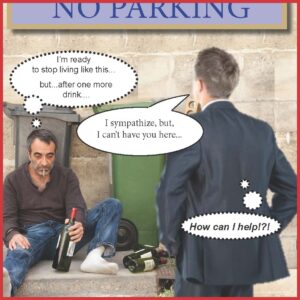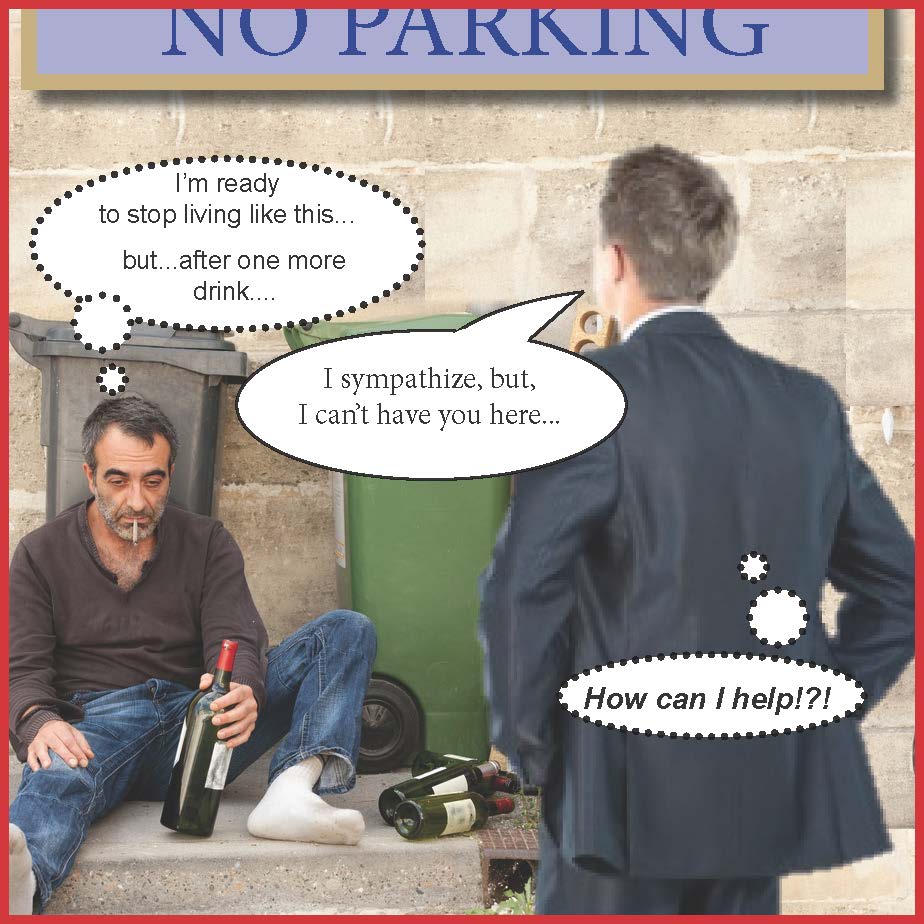By Jeremy Reynalds, Ph.D.
Founder and CEO
Joy Junction Inc.
 After 34 years of helping New Mexico’s homeless, I am convinced that there is nobody who doesn’t “want” help.
After 34 years of helping New Mexico’s homeless, I am convinced that there is nobody who doesn’t “want” help.
While an addict’s negative response to what would seem like sensible assistance-a trip to a detox or homeless shelter-may result in the statement, “Well, he doesn’t want help,” we need to go beyond that.
People don’t set out to be addicts. Someone’s sink into addiction often begins with an abuse of alcohol or drugs to mask unbearable emotional pain. The substance soon becomes a cruel taskmaster, and the quicksand of addiction begins.
A bed in an apartment is exchanged for a precarious existence on city streets, where an addict wanders and wobbles from one fix or high to the next.
There’s an emotional and physical component of successful recovery, and while we hope an addict will take the first step when we want, that doesn’t always happen. But until an addict is willing and able to walk down recovery road, his or her life can often negatively impact many other people who cross their path.
A drunk person’s lack of inhibitions often results in using the bathroom in public and sleeping-along with a few cans of beer-outside someone’s business. That behavior and similar has resulted in consequences such as anti-homeless spikes being placed in areas frequented by the homeless, and dividers being placed on public benches to stop the homeless sleeping.
It was my Facebook posting of an Upworthy article dealing with an attempt to make these anti-homeless spikes a bit more comfy that had a local businessperson a little upset. Acknowledging that it’s a difficult problem to which she didn’t have a ready answer, Barbara asked, “What about the destruction and trashing of private property by those who refuse help?”
Barbara said she used to manage a small shopping center where homeless people would sleep in the bushes. Every Monday, Barbara said, her crew would pull a 33 gallon trash can of beer cans and bottles out of the bushes.
She added, “We had to hose off the doorways in the courtyard in the mornings because they would urinate on the doorsteps and defecate in the parking lot. They would vomit on the walls.”
Talking with these individuals didn’t work, Barbara said. They were either too drunk or too combative. An offer of a ride to a shelter wasn’t welcome either.
Barbara said, “We finally took the bushes out. They would sleep in the courtyard. We would have to call the police because of the safety and cleanliness we owed the customers of our tenants. What is the answer? Some simply don’t want help.”
Barbara has a point, so I posed this question on Facebook. “What is the answer for those who are addicts, and for whatever reason are unable to receive or decline help? As a community, how do we help those in the throes of addictive behavior while helping and preserving the rights of someone like Barbara?”
Samantha said we aren’t commanded to love those who want to be love, or help those who want to be helped.
She continued, “Even people ‘who don’t want to be helped’ are people, and they have hearts that were terribly broken somewhere along the way.”
However, she conceded, “If your property were being violated to such an extent, some type of legal protection would probably be necessary.”
Samantha encouraged everyone to keep praying rather than give up or write people off. “We forget the power of prayer. We can do all we can do in the flesh, and sometimes it is simply a heart issue. Keep praying for these people; you might be the only one doing it.”
Pam, another Facebook friend, was clear about how she felt. She said those people who feel business owners or city officials are hard hearted for wanting to remove the homeless from certain areas should “be the ones to go from place to place and clean up the trash, urine, poop, needles.”
She continued, “They would be the ones picking up the tab for the trash bags and other materials needed to clean the places … They would be working with zero pay as well. These are all things the shop owners have to do. I think their tune would change real quick when they saw the ‘dirty’ side of it all.”
So what is the answer? One way to start working toward a solution is to talk to people who have “been there.”
I asked our resident services manager at Joy Junction to talk with some of our guests who at one point had been through the grips of alcohol/drug addiction, and see what it had done to them.
A 56 year old woman who said she had been “drinking, drugging and having sex” since she was 13, said the short answer is what her addiction “didn’t” do to her.
She wrote, “The unremembered days day, blackouts, drunken sex, STDs, the violence, hurt to family and friends, the hurt to myself-self esteem, loving, resentment of myself, my broken bones, being beaten and suicidal thoughts.”
She recalled sleeping in a pup tent by the Sacramento River under a bridge and bushes.
“I was hungry, thirsty and scared. Many times I’ve been used and abused and with all of this comes defecating, urinating in public and soiling myself.”
However, good news came. This woman said, “After many years of trying to quit, I did it by just trying and realizing that my addiction was getting me nowhere. It worked, but I’m still working on myself here at JJ.”
Another of our guests was formerly addicted to heroin and meth. She said her addiction has caused her multiple problems, including giving custody of her children to her parents.
She said, “I still feel so much guilt for not getting myself together before it was too late. This caused me to have a very bad relationship with my family. It has also caused many physical problems such as permanent track mark scars, Hep C, and messed up teeth. My addiction is the reason for my homelessness. “
While using, this woman said, she would crash at friend’s houses and also in doorways. The situation got so bad that earlier this year she ended up in hospital as the result of an infection incurred for shooting up in her leg.
She said it was while in the hospital she decided to get clean, adding “I did not want to end dead like my friend who overdosed on heroin. After I got out of the hospital, I got on Suboxone and came to JJ. I’ve been clean for almost seven months.”
Almost as an afterthought she added, “By the way I’ve never defecated on myself, but I’ve urinated in public and on myself. It was gross. Actually, my pants were soaked when I got to JJ.”
A male guest told us, “My defects really made a mess of my life. “ He said that alcohol abuse and marijuana resulted in his getting fired from a job. Meth came later. He said that addiction made him think he was invincible.
He poignantly continued, “I remember one time when I was high. I was very well dressed, but there was no restroom around. I even looked for a bush, but found nothing. I had no choice but defecate in my pants. This caused me to get off of crack for a short time.”
Barbara, whose comment initiated the writing of this column, said she knows this is a difficult situation for everyone concerned.
She added, “My personal experience has been that some want and will accept help but there’s a subset that don’t. (It’s a ) hard place for those who care for the less fortunate, but also deserve to not have the things they’ve worked hard for destroyed. I don’t know the answer.”
But what was the turning point for the man who defecated in his pants? He said, “I remember that after I bagged the pants and through them in a waste bin, my apartment manager found them and had them cleaned for me. What a great man! I’ll never forget his generosity. That kind of kindness caused me to change my life and try to find help.”
Maybe that’s a place at which a conversation could start. But the dialogue will need to be one embraced by the entire community. What do you think?


